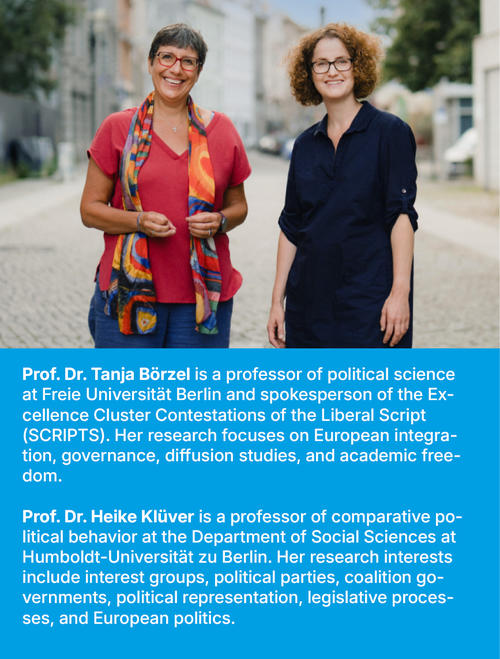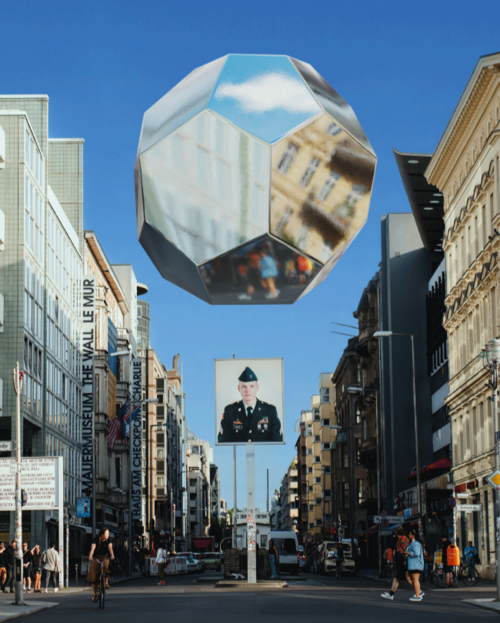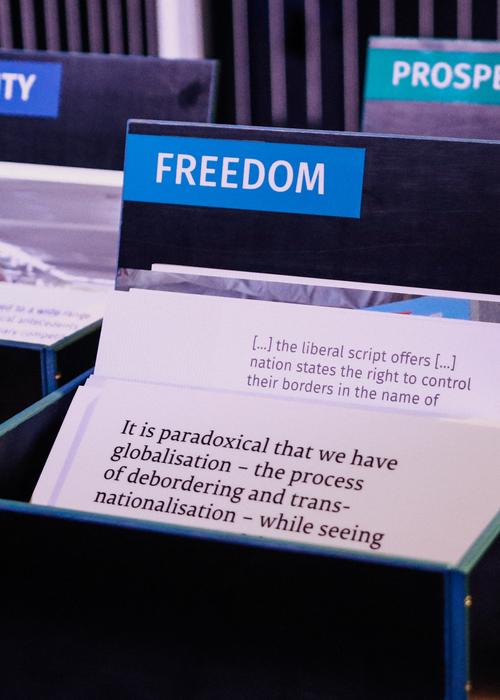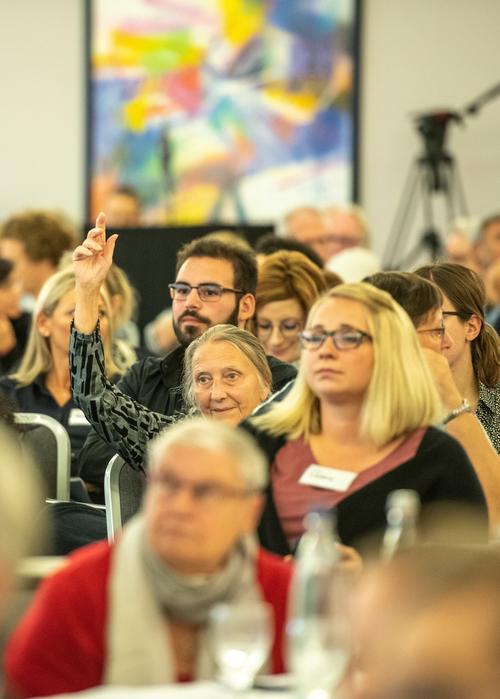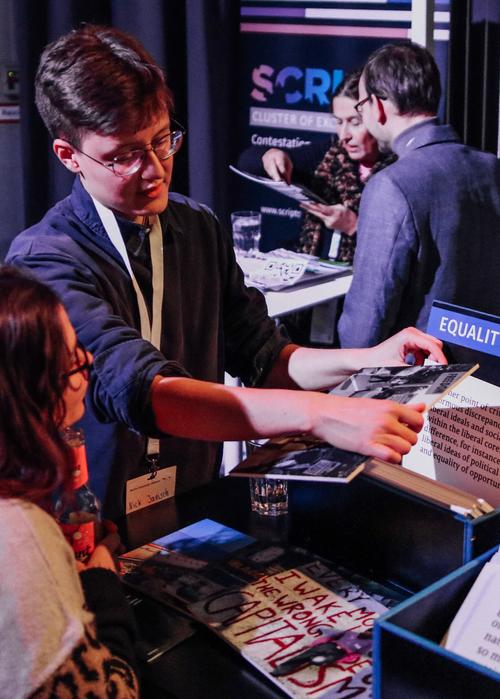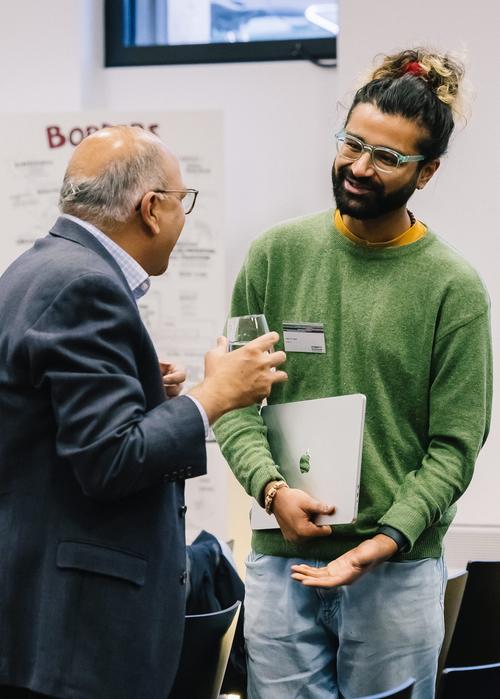The liberal script put to the test
Research at the interface between science and politics
Hardly any other Cluster of Excellence is as closely linked to current political events as “Contestations of the Liberal Script (SCRIPTS)”. What is described there in abstract terms as contestations - i.e. disputes about the liberal script - manifests itself very concretely in socio-political debates and conflicts, both in Germany and Europe, as well as around the globe.
At the heart of this is always the tension between individual freedom and the common good and therefore the question, relevant to each and every one of us, of the extent to which the rights of the individual may be restricted in favor of the community. So what is the liberal script all about?
Political scientists Prof. Dr. Tanja Börzel, spokesperson for SCRIPTS, and Prof. Dr. Heike Klüver provide an insight into the work of researchers at the Cluster of Excellence and its particular proximity to politics. A conversation about academic freedom, democratic resilience and the desire to enjoy diversity.
The 12 mirror surfaces of the dodecahedron are an expression of the diversity of perspectives and reflexivity of research at SCRIPTS.
Mrs. Börzel, the object that symbolizes your Cluster of Excellence in the campaign is a mirrored dodecahedron, i.e. a twelve-sided geometric body. What is it all about?
Tanja Börzel: At SCRIPTS, we look at the liberal script and its controversies from many different theoretical and methodological perspectives. At the same time, we are constantly reflecting on our object of research, the research context and also the process of how we conduct our research. The 12 mirror surfaces of the dodecahedron are an expression of this diversity of perspectives and reflexivity.
The subject of your research is the liberal script. What do you understand by this term?
Börzel: The liberal script is a concept under which we summarize liberal ideas and institutions for the organization of societies. The disputes surrounding these liberal ideas of order and institutions are reflected in very specific socio-political controversies: these include the rise of right-wing populism in large parts of Europe, dealing with the COVID-19 pandemic - for example, the issue of compulsory vaccination and the closure of schools, or the current debate about anti-Semitism. These are all topics that affect the liberal script. Because they always involve the question of the extent to which my individual rights may be restricted by the community for the good of the community. So our research has a lot to do with each and every one of us.
So is SCRIPTS helping to save liberalism?
Börzel: We are not the cluster defending the liberal script. But if we understand how conflicts surrounding the liberal script work, what driving forces are behind the increasing radicalization and polarization, for example, and what effects this in turn has on the liberal script, then we can also consider how the resilience of liberal societies can be strengthened.
Mrs. Börzel, you are researching the topic of academic freedom. Why is this so important for a liberal society?
Börzel: The idea of the critical individual is central to liberalism, think of the Enlightenment, i.e. the liberation from self-inflicted immaturity: science strengthens the ability to critically question, which forms an important basis for individual self-determination. To this end, science must be free, because narrowing the perspective from the outset to what politics and society find helpful and acceptable massively restricts the ability to think critically and reflect. For illiberal regimes, academic freedom is a threat because it critically questions the seemingly given and enables and encourages people to question critically.
Academic freedom plays a decisive role not only for individual, but also for collective self-determination: in a liberal society, there are different, sometimes conflicting interests that are reconciled through the exchange of knowledge-based arguments. Science is therefore essential for a democratic culture of debate. But we can only strengthen this, too, if science is free.
What specifically have you researched?
Börzel: We have examined academic freedom as a norm and part of a global liberal script. Is there a specifically liberal understanding of academic freedom that is shared worldwide? The starting point of our research is that the tension between individual and collective self-determination described at the beginning also characterizes the disputes surrounding academic freedom.
In Western democracies, the focus has long been on the individual freedom of academics in their research and teaching. According to Article 5, paragraph 3 of the Basic Law, research and teaching are free, but this freedom is subject to certain limits that are set collectively. At the same time, science as an institutionalized system is allowed to decide for itself how it researches and teaches, i.e. without external interference, for example by the state. As a collective dimension of academic freedom, the independence of academic institutions is becoming increasingly important in the face of political attempts to determine the content of research and teaching - for example in the USA, where public universities are being forced to limit their commitment to diversity and inclusion and to discontinue gender studies programs.
Citizens' Council, which SCRIPTS investigated in a field experiment with the NGO “Es geht los”. © SCRIPTS
Mrs. Klüver, you are also a political scientist at SCRIPTS. You are researching a challenge to the liberal script that we are all currently experiencing first-hand: the rise of populism.
Heike Klüver:In my projects at SCRIPTS, I look at various instruments that can be used to increase what I call the democratic resilience of citizens. In recent years in particular, there has been increasing polarization and radicalization. We are investigating which instruments can help us to successfully counter growing populist extremist forces in particular.
Specifically, for example, we investigated the extent to which new forms of democratic participation can lead to voters regaining confidence in established democracy and also becoming more involved in the democratic process themselves.
What forms of democratic participation could these be?
Klüver: This could be, for example, so-called “citizens' councils”, for which we conducted a field experiment together with the NGO “Es geht los”. Citizens' councils are randomly selected groups of citizens who come together to discuss political issues and, if necessary, develop recommendations for decision-makers. Citizens are randomly selected to form a representative and diverse group that reflects the entire population so that the discussions and recommendations take into account as many perspectives and interests as possible.
“Es geht los” has held a total of 17 such citizens' assemblies, in which around 25 people came together for a weekend and discussed a political topic with the respective constituency representative. We scientifically monitored these citizens' assemblies as part of a field experiment to investigate the extent to which participation in citizens' assemblies can strengthen the democratic resilience of citizens. We were able to show that participation has a significant positive effect on their trust - both in democracy and in political institutions. Participation also has a positive effect on whether people want to participate in the political process again. At the same time, it has a negative effect on whether people are susceptible to conspiracy theories.
Such findings have a direct benefit for politicians, but also for us as citizens. How do you share your knowledge?
Klüver: At SCRIPTS, we make a variety of efforts to make our scientific findings available to the public as well as to decision-makers. For example, we run the Knowledge Exchange Lab, where we also hold events for the general public. These are also attended by people from politics and journalists, with whom we then enter into a direct exchange about our findings. We also prepare our studies for social media and regularly post articles on our current research.
How do you communicate with politicians?
Klüver: We also make our findings directly accessible to politicians. As part of the Citizens' Councils project, for example, there was a workshop in the Bundestag where we presented our findings to decision-makers. We also presented the findings of a study on vaccination readiness during the coronavirus pandemic directly at a Bundestag hearing and were thus able to provide evidence-based information to the legislative process.
After all, we are in frequent contact with political parties and foundations. We hope that through this exchange we can contribute to strengthening our democracy.
Börzel: We are working closely with the Federal Foreign Office, currently on the Gaza conflict: together we have asked ourselves what the prospects are for a two-state solution after the end of the war and how it could be realized. We first discussed what knowledge we could provide for the Federal Foreign Office. We then consulted our own research, processed the knowledge and discussed questions. Such an exchange is based on trust, which we have been able to build up over many years of cooperation with the Federal Foreign Office.
The topics you are both researching suggest a great diversity ...
Börzel: Our motto at SCRIPTS is excellence through diversity. For us, diversity in research is not a contradiction to excellence, but through diversity we achieve excellence.
You say that diversity is also reflected in the people who conduct research with you and their different perspectives. Is it easier in Berlin than elsewhere to bring many different minds together?
Börzel: The idea of achieving excellence through cooperation is a key reason why colleagues choose Berlin, especially those from abroad. Those who come to Berlin also do so because of the opportunity to conduct excellent research across disciplines. We have attracted a large number of international researchers here, including from the so-called Global South or, as we call it, from regions that are underrepresented in science.
Ich finde, dass wir damit zur Attraktivität des Wissenschaftsstandort Berlin beitragen und die Stadtgesellschaft bereichern!
Mrs. Börzel, Mrs. Klüver, thank you very much for the interview!
Interview: Julie Spielmann


